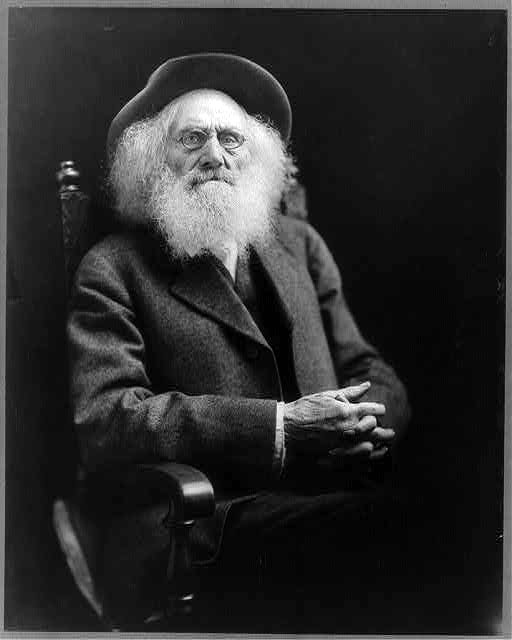
Meeker Street is a main thoroughfare through the city of Kent, Washington. Meeker Days is a popular annual festival in the nearby community of Puyallup. Dozens of local businesses in Washington’s King and Pierce counties, from delis to dry cleaners, have “Meeker” as part of their name. There is a Meeker Elementary School, a Meeker Middle School, and a Meeker Junior High. Who was this Meeker guy and what did he do to leave such a lasting presence in the region?
Ezra Meeker was many things – Northwest pioneer, hops farmer, businessman, and active advocate for the Pacific Northwest and for the preservation of the Oregon Trail. Ezra and Eliza Meeker traveled west across the Oregon Trail in 1852, enduring the hardships typical of many that crossed the route. They settled in the Portland area, then moved around to different Western Washington locations before finally finding “home” in Puyallup in 1862.
Ezra Meeker: Founding Father and Hop King
Ezra Meeker was Puyallup’s founding father, platting out the town as part of his homestead in 1877 and later becoming Puyallup’s first official mayor. Puyallup’s early days were prosperous ones, where the region was a booming hop-growing center. The local hop industry flourished for almost three decades and Meeker was at the center of it all. Known as the “Hop King of the World,” he was an active promoter of the region’s bounty, traveling to the East and even to Europe to move local product. By the year 1887 they began construction on a large mansion that, at the time, was said “to be the showplace of the Pacific Northwest,” according to Puyallup historians Lori Price and Ruth Anderson. Many associated with the Puyallup hop industry grew wealthy and built fancy houses; with Meeker’s home considered the most luxurious. Shortly after the Ezra Meeker’s new mansion was completed in 1891, all the prosperity came to an end when a hop louse infestation decimated the region’s hop fields.
Hard Times for the Meekers
The 1897 Klondike Gold Rush helped shape the character of Seattle and the surrounding region. It brought people and money to the city, where local businessmen supplied eager miners setting out for Alaska and the Yukon. The Gold Rush contributed to the Northwest reputation for a boom-and-bust economy based on the exploitation of natural resources. Like many others, Ezra and Eliza Meeker joined the fray, using the Mansion’s kitchen to preserve foodstuffs to sell to the gold miners. Mr. Meeker traveled to the Yukon, opened a store in Dawson, and sold the fruits and vegetables at a premium, making a generous income before losing it in a mining investment. Like many others, he returned to Washington with empty pockets.
Ezra Meeker and the Oregon Trail
On a national level, Ezra Meeker is best known for his efforts to mark and preserve the Oregon Trail. Meeker believed that the Trail, which was rapidly disappearing with the settlement of the West, needed to be preserved for posterity. In 1906, he set out from Puyallup in an ox-pulled covered wagon and traveled the Oregon Trail once again, giving lectures to raise awareness and funds along the way. He used the money to procure stone markers to blaze the historic route; many remain in place today. After reaching Independence, Missouri trailhead, Meeker continued on to New York and Washington D.C. His goal, convincing Congress to honor the memory of the Oregon Trail with a cross-country highway, remained an objective for the remainder of his years. He continued this effort until his death, crossing the Trail once more by wagon, then by automobile, and finally by airplane.
Ezra Meeker died in 1928 and is buried next to his wife, Eliza, in Puyallup’s Woodbine Cemetery.
Where to Learn More about Ezra Meeker
Sources:
- Ezra Meeker: Compiled from His Own Writings. Puyallup, WA: Ezra Meeker Historical Society, 1972. (Check price on Amazon.com)
- Price, Lori and Ruth Anderson. Puyallup: A Pioneer Paradise. Charleston, SC: Arcadia Publishing, 2002. (Check price on Amazon.com)
- Welcome to the Meeker Mansion. Ezra Meeker Historical Society.
